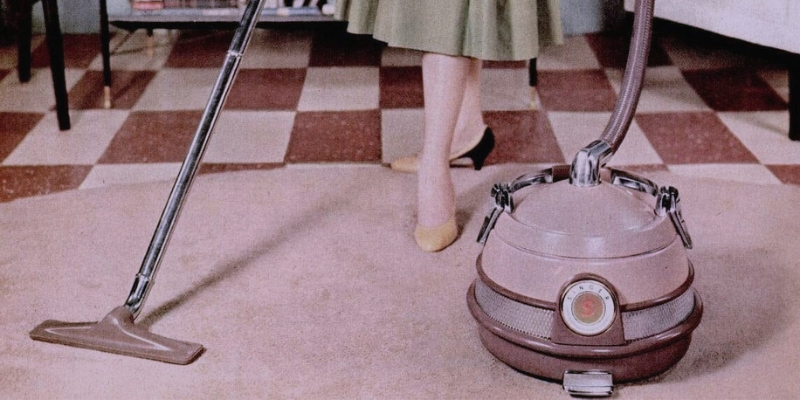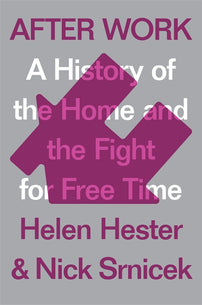After Work: a Letter from the Editor
"Study after study over the last century has confirmed again and again: technology has not reduced the amount of time spent on domestic labour in the home. How can that be true?"

In the acknowledgements of After Work, the authors thank me (unnecessarily) for never complaining about toddlers crashing our editorial meetings. Reading it, I was reminded of that viral clip in which a toddler and then a baby in a walker confidently and playfully barrel into the room behind their dad, who is being live interviewed on the news as an expert. Probably, like my partner, you’ll be incredulous when I tell you that the clip is from before the pandemic, when children on video became the norm in every online workplace. It’s actually from three years prior, the bygone era of 2017.
During the lockdowns, many of us also lost a reliable sense of time. Denise Riley writes in Time Lived Without Its Flow about the sensation of timelessness that often follows from sudden or traumatic bereavements. When something foundational is suddenly lost, time ceases to have meaning. In the early weeks of the pandemic, many of us were cut adrift from the reliable foundations of our everyday lives: get up, get ready, go to work, come home. Time felt like soup, everyday the same, unlike any day prior to March 2020. The luckiest among us were no longer compelled to go to their workplaces, which felt for some—for a moment—like freedom (how many people do you know who took up a new hobby, and likely learned how to make sourdough?). But even for those lucky enough not to be deemed a ‘key worker’, their workplaces were suddenly in their houses, invading their sanctuaries, blurring the distinction between work and free time. Suddenly, in 2020, the spaces where many parents worked and the spaces where their children played were the same space. An overnight collapse of the public-private divide.
Of course, houses have never actually been free from work, and the public-private divide was always partly fiction. In fact, the home was the original workplace. Helen Hester and Nick Srnicek’s After Work starts from this simple fact, tracing the evolution of work within the home, from the industrial revolution in the home in the opening decades of the twentieth century. As they chart,
Prior to this transformation, housework was exhaustingly laborious. The raw materials for sustaining life and the home were brought in from outside the domestic residence. Lighting for instance, was provided through kerosene lamps and fireplaces, but required significant effort to maintain: chopping wood, collecting coal, tending lamps, and so on. Likewise with heating, stoves required large amounts of wood to be chopped and carried inside. Water had to be pumped and brought in for cooking, cleaning and bathing … And just as resources were required to be imported into the home, so were waste products required to be exported from it. Laundry suds, chamber pots, ashes, and so on were all constantly flowing out of domestic residences, frequently carried in the hands and on the backs of family members.
With the dawn of the twentieth century and the introduction of running water, electricity and gas, this work was radically transformed, laying the foundations of the individual devices we now associate with labour-saving within the home: the washing machine, dishwasher, and the vacuum cleaner. What is remarkable, though, is what didn’t change. Study after study over the last century has confirmed again and again: technology has not reduced the amount of time spent on domestic labour in the home. How can that be true?
Helen and Nick set out to explore this seeming paradox, revealing a complex set of dynamics to which we must pay attention if we are ever truly to be liberated from the drudgery of work. We should know by now that the robots will not simply eliminate work, and that’s as true in the home as it is anywhere else. We must also understand how societal expectations and standards of cleanliness—not to mention domestic advertising—impact our perception of what must be done, and, further, we must pay attention to social organisation and space. How did the single family home become the norm? What other alternative ways of living were discarded or suppressed along the way? As they traverse the twentieth century, Helen and Nick salvage experiments in alternative living arrangements and architecture—from the commune to the apartment hotel, from the self-cleaning house to the kitchenless apartment.
Publishers are often anxious about the timeliness of a book, concerned about how quickly the book needs to come out to ‘meet the moment’, whether it will still be relevant once it’s been through all of the fifty-thousand steps of the process from manuscript to finished object. Will it be ‘in time’ for its argument to land? In this case, the questions animating the book have only become more pressing—the pandemic fundamentally changed how many of us think about the work that takes place in our homes, and changed how many of us think about our precious free time, too.
I first talked to Nick and Helen about this project seven years ago, back in 2016. In the intervening years they’ve become the parents of the aforementioned editorial-meeting-crashing children, which I can only imagine felt like a kind of method-acting for non-fiction writing as they tried to find the time between nappy-changes and naps to finish their book about fighting for free time. The result is clearly and indispensably informed by the experience of being time-starved parents of young children (the first draft of the chapter on the family came in at 50,000 words long).
Ultimately, Helen and Nick’s contention is that time is at the heart of liberation. What we are aiming for, they insist, is a society that expands the realm of freedom, “enabling people to meaningfully ask (and answer) the question ‘what should we do with our time?’” What might that look like?
Rosie Warren, Verso Editor
London, June 2023
After Work: A History of the Home and the Fight for Free Time by Helen Hester and Nick Srnicek is one of our June Verso Book Club reading selections! See more about the Verso Book Club here.
[book-strip index="1" style="buy"]
